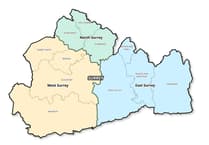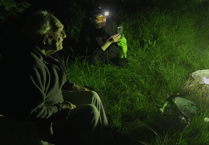THE Liberal Democrat slogan, "861 to go", came back to haunt the pretenders to the parliamentary seat of South West Surrey last Thursday, as Conservative Jeremy Hunt stormed to victory with a majority of 5,711. The constituency had been the Lib Dems' number three target, the outcome popularly believed to be poised on a knife edge. The MORI exit poll, which selected the polling station at St Peter's School, Wrecclesham, as one of 120 across the country to chart the national trend, showed the Tories ahead after voting closed. But Conservative Party supporters were clearly surprised and relieved at the scale of their victory, erupting in cheers which drowned out returning officer Christine Pointer before she could announced the full figure for the votes cast for Mr Hunt. The declaration, at the count at Farnham Sports Centre, came just after 3 am, by which time it was already clear that a Labour government would be returned, but with a much- reduced majority. Jeremy Hunt took 50.4 per cent of the votes cast; his figure of 26,420 being 3,958 more than that polled by by his predecessor as MP, Virginia Bottomley, in 2001. The Liberal Democrats' Simon Cordon, who came within 861 votes of unseating Mrs Bottomley in 2001, saw his vote drop by 892 to 20,709. There had been no love lost between the two main candidates during the campaign, although on local issues they had often backed the same causes. In his speech after the declaration, Jeremy Hunt gave the traditional thank yous to the Conservative team, his family and friends, then congratulated Simon Cordon on a very determined campaign, particularly in relation to saving Milford Hospital. He referred to his understanding of the NHS as "second to no one". For Simon Cordon, defeat was a bitter blow, coming after seven years of campaigning on local issues. For the past two years, he had given up his job to fight the seat full time. After congratulating Jeremy Hunt, he announced: "It is a dangerous thing to think of the future when an electoral defeat has just come about, but in the next few weeks I may reflect on a different way in which to serve the community." Speaking afterwards to The Herald, he suggested there had been a clear public desire to get rid of the Blair government and people in the South had seen voting Conservative as the way to do it. Winning the seat would be tougher for the Lib Dems from now on, because of the "credibility argument" arising from the current defeat, he said. Labour candidate Tom Sleigh, clearly thrilled with his 4,150 votes, representing nearly eight per cent of the poll, believed Labour had been a victim of tactical voting, as always in South West Surrey. He said the Labour team had distributed five times the amount of election literature that it managed last time, and found considerable support on the doorstep, although not always converted into votes. Speaking to The Herald the following morning, Jeremy Hunt, the constituency's new MP, said he was thrilled with the result. "I think it's a huge honour to represent the area I grew up in. Now I've got a huge amount of work to do. Lots and lots of people have written to me about issues they want me to become involved with. "I'm following in the footsteps of someone who was an outstanding MP for 21 years. I've got to learn the ropes pretty quickly." He admitted to surprise at the size of his majority and attributed it to both local and national factors. "We worked very hard on the campaign. From the moment I became the prospective parliamentary candidate two and and half years ago, we never thought South West Surrey was ours for the taking. We always thought we had to earn every single vote. The public perception of discord within the Lib Dems on the local councils had, he believed, played some part. "The primary basis of the Lib Dem appeal is what they do locally. They haven't been in power since the 1906 government, so if they have problems locally, that has more of an impact than if would on either of the two big parties. "I don't think that was the whole story. I think there was a feeling across the whole south of England that the only real way to give the government a strong message was to vote Conservative. "People were concerned that quite a lot of Liberal Democrat policies were to the left of Labour and that might be why Liberal Democrats did much better in the north of England than they did in the South. "I think there is a general feeling of disappointment in all politicians. The biggest responsibility of my generation of poliiticians will be to restore the trust between politicians and the people that elect them." He believed the Conservatives had restored their credibility as the principal opposition party, although he felt there had been disappointments for all parties on the national stage. "We recognise that Labour has been returned with a comfortable majority, so there's much more work to be done."



